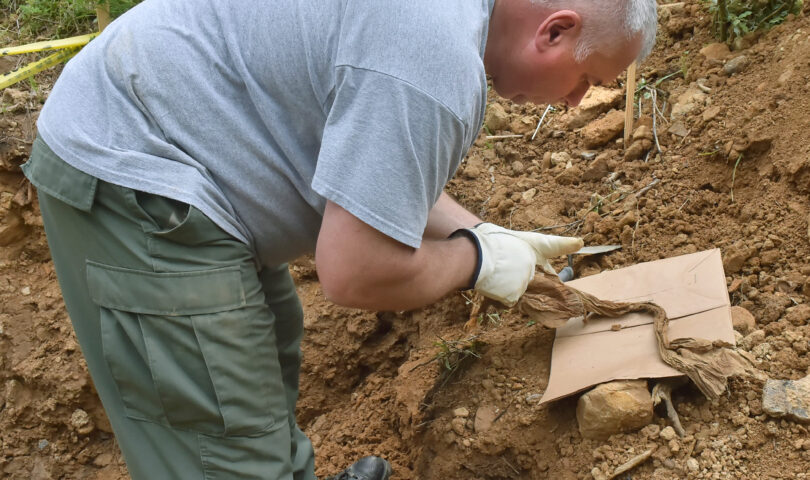When Richard and Bess Ferrell celebrated their 60th anniversary around 2003, the occasion at their church in Quinwood, Greenbrier County, turned into a testimonial of sorts.
It was litany of good works recounted by friends and family.
Such as the one Christmas the Ferrells bought toys and other presents for another husband and wife who were struggling – so a set of young children could have gifts under the tree from Santa that morning.
And when they would fill a cart at the IGA on their dime so another family could eat.
Factor in Richard’s handyman skills and Bess’ sparkling humor and warm, prayerful advice, and you had two very special people, those assembled at the church said that day.
Two people, they were quick to add, who simply did nice things for others without being showy about it.
“That’s just how they were,” their nephew Steve McGuffin said Friday. “Which is pretty amazing when you think about everything they went through.”
What they went through, McGuffin said, was evident by the one void that couldn’t be filled at the church that day, no matter how many praises were sung.
Their daughter and only child, Karen Ferrell, wasn’t there.
She was taken away from them on a cold January night in Morgantown in 1970.
Staring at the phone
Karen, who was 18 and in her freshman year at WVU, was hitching a ride back to her dorm with her friend, Mared Malarik, who was the same age and in the same year of school.
The pair became fast friends during freshman orientation, despite having distinctly different backgrounds. Karen was a coal camp kid from the Mountain State and Mared hailed from suburban New Jersey.
In the meantime, everybody thumbed back then, so none of their other friends thought much about it when the two were seen climbing into a cream-colored sedan.
Four months later, a National Guard unit discovered their decapitated bodies in a rural, wooded area near Morgantown. Their heads have yet to be located.
Chilling letters, hints of murderous cults and a dubious confession of murder would follow, but early on, there was only Bess, in a chair, in her living room.
She spent hours staring at the black rotary dial telephone on her side table – willing the device to ring with news – even as Richard willed himself back to work on his coal mine shift.
McGuffin, who is a rehabilitation counselor in Staunton, Va., was around 2 when his cousin and her classmate were killed. He likely met Karen, he said, but he doesn’t remember.
His mother and Bess were sisters. As a child, he often spent his summers at the Ferrell house in Quinwood, so he became close with his aunt and uncle.
Growing up, he occasionally heard stories about the murders – but never from them.
It wasn’t necessarily dwelled upon, because, sadly, no one had to, he said.
The implication of it all was just there, unspoken, like the ghost of a morning fog in a West Virginia valley.
That’s why McGuffin was intrigued by the action taken by West Virginia State Police two weeks ago.
Digging for closure
The agency reopened the 52-year-old case, based on the urging of a former state National Guardsman whose unit discovered the bodies. The Dominion Post agreed not to use his name.
Digging at the site has been going in earnest, since cadaver dogs all showed keen interest in one particular area.
Comb that area, the former guardsman contends, and you’ll find in the soil, sand and strata what he calls “the overlooked confession.” The missing remains.
The man, who was the second on the scene after the discovery, delved into a once-cold case with some theories of his own – and now, a half-century later, State Police is taking the direction.
Having the full remains back home, the man said, might mean the victims can finally rest in peace. Closure is still an important thing, he said.
“They may still have family in West Virginia, in New Jersey,” he said.
At the site last week, Dave Castle, a crime scene investigator with the State Police, agreed.
“They’re why we’re here,” he said. He was referring to the victims, their parents and anyone who tiptoed through the brush in 1970 hoping for a resolution.
Grief into grace
McGuffin wants resolution, too – more than most, perhaps.
His aunt and uncle, he’ll point with pride, were active participants of the Greatest Generation.
Richard was a combat medic in World War II.
Bess was a Rosie the Riveter in Baltimore.
Now, he finds himself circling back to his cousin and her friend, and that cold night, and how it might have been – horribly slammed and shaken with how it turned out.
He thinks about the graduation ceremony that didn’t happen, and of careers balanced by marriage and babies, if that’s what the two had wanted in their respective lives.
Sadly, wrenchingly, he said, they were never allowed to decide.
In the midst of it all, he of course thinks about his aunt and uncle, who spent the rest of their days piggybacking that void. Richard passed in 2004. Bess died in 2010.
He thinks back to that anniversary party. He thinks about a couple that turned profound grief into amazing grace.
“They lost everything but they didn’t draw in on themselves. Instead, they did for others.”
TWEET @DominionPostWV




